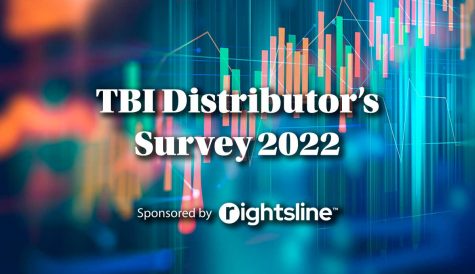
After more than 35 years of operation, TBI is closing its doors and our website will no longer be updated daily. Thank you for all of your support.
TBI DISTRIBUTOR SURVEY 2016: Brexit and consolidation
 Distribution is an international business, so it was not surprising that the execs TBI has spoken to since the UK made its historic vote to leave the European Union largely thought it was a bad decision. But is it bad for business?
Distribution is an international business, so it was not surprising that the execs TBI has spoken to since the UK made its historic vote to leave the European Union largely thought it was a bad decision. But is it bad for business?
Brexit – the international impact
 Currency issues have a different impact depending on where you are based and the measures in place to offset fluctuations. Uncertainty, however, is debilitating. “The short term economic uncertainty is destabilising but otherwise it is too early to tell,” says FremantleMedia International boss and distribution veteran Jens Richter.
Currency issues have a different impact depending on where you are based and the measures in place to offset fluctuations. Uncertainty, however, is debilitating. “The short term economic uncertainty is destabilising but otherwise it is too early to tell,” says FremantleMedia International boss and distribution veteran Jens Richter.
 There are also concern about selling into the UK, depending on the trade agreements and tariffs agreed after Article 50 (whicg starts the EU exit process) is triggered and Brexit begins in earnest. Arabelle Pouliot-Di Crescenzo (right) from French distributor Kabo International raises the prospect of protectionist measures that could “limit opportunities for foreign companies to sell content into the UK”.
There are also concern about selling into the UK, depending on the trade agreements and tariffs agreed after Article 50 (whicg starts the EU exit process) is triggered and Brexit begins in earnest. Arabelle Pouliot-Di Crescenzo (right) from French distributor Kabo International raises the prospect of protectionist measures that could “limit opportunities for foreign companies to sell content into the UK”.
“It will make things more complicated,” adds New Media Vision founder Todd Lituchy.
BBC Worldwide is the biggest distributor in the world outside the Hollywood majors, and the world’s largest exporter of UK content. “It’s too early to predict the effects of Brexit on our industry or company,” says president, global markets, Paul Dempsey. “We have always been proud of our role of taking British content to the world and that will continue.”
 For indie distributors one impact could be a lack of funding help to attend the major programming markets.
For indie distributors one impact could be a lack of funding help to attend the major programming markets.
“Brexit will mean a loss of Media funding from the EU for creative documentaries and a loss of financial support to attend key markets,” says David Hooper from factual distributor Espresso TV. “Our costs will rise.”
For the bigger distributors the global nature of the distribution business is less important than other issues. “Regarding Brexit, good content will remain in demand in the international marketplace,” says Cineflix Rights boss Chris Bonney. “We are less concerned about Brexit, as our sales activity is well spread between global regions and we are proactive in managing currency fluctuations.”
UK and international producers are evaluating the impact of Brexit on their business, but it is clear there are knock-on implications for content sellers, notably in terms of what they acquire.
“There is an element of uncertainty as to how the distribution business will be impacted by the UK exiting the EU and the extent to which that will directly affect the industry,” DRG says in its survey submission.
“There will be questions around UK content qualifying for EU quota status, the impact upon production costs for UK producers and whether this will make UK content less desirable within the EU. If so, that could have an impact upon the type of content we are acquiring, where it originates from, and where our key sales territories are.
Industry consolidation
 Distributors widely expect more consolidation over the next couple of years. Some huge deals have already been done, and, execs say, it looks like more are in the works.
Distributors widely expect more consolidation over the next couple of years. Some huge deals have already been done, and, execs say, it looks like more are in the works.
The distribution consolidation will be driven in part by higher-level mergers and acquisitions. “Consolidation in the media business is a constant and distribution is just one small part of the whole, and distribution consolidation will be driven by larger corporate deals,” A+E says in its submission.
Others suggested distributors need to be either big or small, and that being in the middle is tough. “Distribution is about the big and boutique, and no one wants to be in the middle ground, where it is hard to compete,” says Endemol Shine International’s Cathy Payne.
Stuart Baxter at Entertainment One Television agrees scale is important because of the costs involved. “The ticket price for supporting shows is spiralling upwards,” he says. “It’s difficult to genuinely be a small indie studio.”
Echoing the points about cost and size, Tricon Film & Television’s Andrea Gorfolova says: “The costs of distribution are increasing, smaller players will have very difficult time staying in business.”
Jon Kramer, boss of one of the industry’s true indies, Rive Gauche, acknowledges it is a tough environment, and says that is driving consolidation. “The overhead costs and mistakes in acquiring [content] will make it very tough for some players,” he says. “To establish a company you need a library that is active. Thats very hard to find.”
Further consolidation is not only inevitable, it is a survival mechanism, says ACTF’s Tim Hegarty. “Unless a distributor manages to get the rights to a show that becomes a worldwide hit, then it’s hard to make ends meet financially. Consolidation is a way to survive.”


